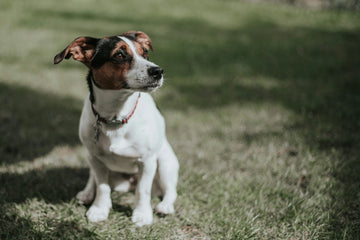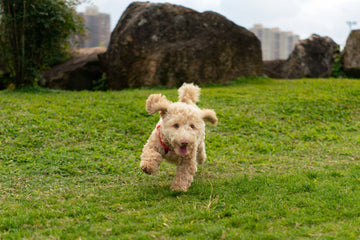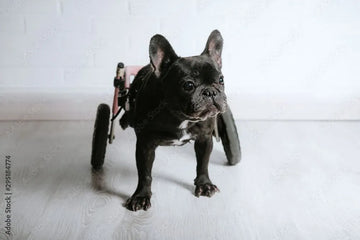Many dog owners have experienced this: you wake up in the morning or finish a nap, only to find your dog’s bedding soaked and smelling like urine. At first, you might assume your dog just couldn’t hold it in—or worse, that they’re being lazy or disobedient. But if it keeps happening, it’s time to take a closer look.
A dog peeing in their sleep isn’t just a potty training issue. It can be a sign of an underlying health problem, hormone imbalance, aging, or even a neurological condition. If you're facing this issue, don't worry—this article will walk you through the common causes, how to manage it properly, and the key things every dog owner should know about dog peeing in sleep scenarios.

I. Why Is My Dog Peeing in Sleep?
Dogs are generally able to control their bladder while awake. Even puppies eventually learn to hold it in through proper training. But when a dog urinates during sleep, it often means there’s a lack of bladder control or they’re unaware it's happening. This is the core issue behind dog peeing in sleep behavior.
Here are the most common causes:
-Weak Bladder Control (Especially in Senior Dogs)
As dogs age, their muscles and nervous system can weaken. In particular, the urethral sphincter may lose tone, making it harder to hold urine during deep sleep. This age-related incontinence is one of the most common causes in older dogs and a leading factor in dog peeing in sleep at night.
-Hormonal Incontinence (Often Seen in Spayed Females)
Spayed female dogs may experience a drop in estrogen levels, which affects the muscle tone of the urinary tract. This hormone-related incontinence typically occurs when dogs are very relaxed or just waking up, contributing to the problem of dog peeing in sleep without realizing it.
-Urinary Tract Infections (UTIs)
UTIs can make dogs feel like they need to urinate constantly. The inflammation and irritation may cause them to release urine even when asleep. Symptoms can include cloudy urine, strong odor, or even traces of blood. These infections are a known trigger for dog peeing in sleep episodes.

-Neurological Issues or Spinal Disorders
Conditions like intervertebral disc disease or spinal nerve damage can interfere with signals between the brain and bladder. Dogs may look perfectly fine when awake but leak urine while sleeping due to nerve miscommunication. This explains some cases of dog peeing in sleep among otherwise healthy dogs.
-Behavioral or Emotional Factors (Anxiety-Induced Incontinence)
Some dogs with separation anxiety or past trauma may release urine while in deep relaxation or under emotional stress. Although less common, this type of incontinence is real and often overlooked. It can result in dog peeing in sleep during stressful life changes.
-Medication Side Effects
Drugs like diuretics, steroids, or seizure medications may increase urination or reduce bladder control. Dogs under these treatments may have higher chances of dog peeing in sleep, especially during long naps or at night.
-Developmental or Congenital Problems
In puppies, the urinary system may not be fully developed. Others may be born with congenital urinary tract or nerve abnormalities, causing frequent nighttime leaks. These issues often present as dog peeing in sleep during early growth stages.

II. What to Do When Your Dog Pees in Their Sleep
The first step is not to scold your dog—they’re not doing it on purpose. A smart response involves observation, veterinary evaluation, and daily adjustments. This applies to all cases of dog peeing in sleep, regardless of cause.
1.Observe and Keep Records
Note the frequency and conditions:
-Is it happening daily or occasionally?
-Does it occur at night or during naps?
-Is the urine clear, cloudy, or smelly?
-Are there signs like licking their genital area or drinking more than usual?
Detailed observations help your vet diagnose the root cause of dog peeing in sleep.

2.Visit the Vet for Testing
Recommended exams include:
-Urinalysis and culture – to rule out infection or kidney issues
-Blood tests – to assess kidney and hormone function
-Ultrasound or X-rays – to examine the bladder, prostate, and other organs
-Neurological assessment – for possible spinal or nerve damage
Early diagnosis leads to better management and lower long-term costs. This is especially important when dog peeing in sleep is frequent.
3.Adjust Daily Routine
-Limit water intake before bedtime (never cut it off completely)
-Take your dog out to pee right before sleeping
-Use waterproof bedding, pee pads, or washable liners
-Increase daytime exercise to reduce nighttime pressure
Routine and structure are key in managing dog peeing in sleep incidents.
4.Nutrition and Medication
-For hormonal incontinence, vets may prescribe estrogen supplements (e.g., DES)
-For nerve-related cases, neuro-supportive medication or B-complex vitamins can help
-Consider urinary tract supplements like cranberry extract
Never administer medications without veterinary approval. These can be essential in controlling dog peeing in sleep long-term.

III.FAQ
Q1: Is my dog peeing in their sleep because of poor training?
A:Not necessarily. While improper training can cause inconsistent bathroom habits, most cases of dog peeing in sleep are due to health issues, not behavior. Don’t blame the dog without investigating medical causes first.
Q2: My dog was spayed years ago. Can hormone problems show up now?
A;Yes. Hormonal incontinence in spayed females can appear months or even years post-surgery. The risk increases with age, as natural hormone regulation declines. This can easily result in dog peeing in sleep later in life.
Q3: Will this problem go away on its own?
A:It depends on the cause. Behavioral incontinence may improve with training and environmental changes, but hormonal or neurological issues usually require ongoing management. The goal is to reduce symptoms and maintain quality of life—not necessarily to “cure” dog peeing in sleep outright.

Dogs can’t tell us when they’re feeling unwell—but they can show us. Urinating during sleep is often a silent cry for help, not disobedience.
As pet parents, we need to approach the problem with patience, curiosity, and responsibility. The sooner we understand what’s happening inside their body, the sooner we can help them feel safe and healthy again.
With timely care, medical support, and a bit of adjustment at home, your dog can go back to sleeping soundly—without the mess or discomfort. Addressing dog peeing in sleep properly is one of the best gifts you can give your pet.
All information provided is for informational purposes only and is not a substitute for professional veterinary consultation.





